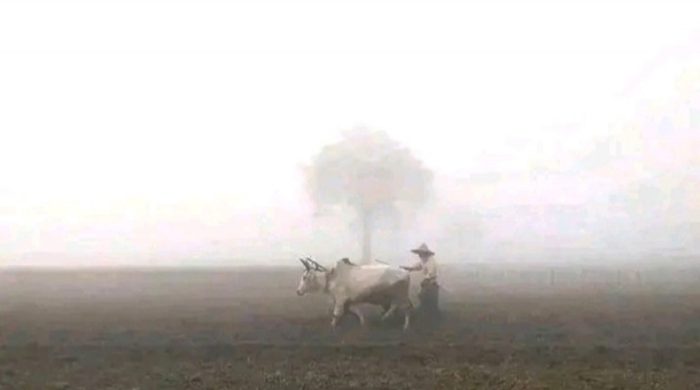Cold wave sweeps 43 dists, wreaks havoc

- Update Time : Wednesday, January 24, 2024
- 44 Time View

A mild to moderate cold wave engulfed about three-fourths of Bangladesh on Tuesday as the country’s minimum temperature continued to fall, bringing misery to people from all walks of life and an abrupt halt to academic activities at places.
Since cold wave means the minimum temperature falling below 10C, primary and secondary schools were supposed to remain closed in 43 of the 64 districts swept by the cold wave. Reports, however, received from districts about chaos over school closure.
Parts of Bangladesh, northern region in particular, have been feeling intense cold amidst dense fog and biting cold wind bearing serious health implications, particularly for children and elderly people for three weeks.
Cold waves became so frequent lately that the winter death toll increased by 84 per cent between January 12 and 15 during the past significant spell of cold wave.
Nearly three lakh people have been admitted to public hospitals so far with acute respiratory illness and diarrhoea due to cold.
Dense fog continued disrupting road, water and air communications, causing ferry services in major rivers to remain suspended every day for hours, leaving people stranded in their cars, and leading to diversion of numerous flights.
New Age correspondent in Rajshahi reported that the authorities announced closure of all academic activities at primary schools but secondary-level educational institutes were open despite temperatures remaining below 10 degrees Celsius.
On Tuesday, Rajshahi experienced the coldest day with its minimum temperature dropping at 7.8C, the lowest minimum temperature recorded this winter for the district.
‘My son is an asthma patient but keeping him in home is a real challenge when school remains open,’ said Morjina Khatun, a resident of Godagari.
She said that the decision of closing all primary schools came just half an hour after the classes were supposed to begin.
In Pabna, schools over 1,500 primary and secondary schools were closed for the third consecutive day, reported New Age correspondent in Pabna.
The northern districts are home to one of the poorest segments of people, thousands living on riverside and in chars where the wind is felt the most.
Hit by the worst economic crisis and disaster one after the other like the pandemic and soaring energy prices, the winter burdened the poor with an extra expenditure.
The poor suffered for they require going outside for livelihood every day with poor warm clothes.
Back in their rickety houses, the poor are exposed to cold wind and freezing mist day and night.
Bangladesh saw its minimum temperature further drop to 6.6C on Tuesday, the lowest temperature recorded so far this winter.
The lowest temperature was recorded in Chuadanga.
Then Bangladesh Meteorological Department said that the temperature is likely to go up over the next three days amidst rain before starting to go down again from January 27.
‘The minimum or night temperature is likely to rise,’ said meteorologist Omar Faruque.
Winter usually sees the minimum temperature to 6C, he said, adding that Bangladesh saw its ever-lowest temperature of 2.6C on January 8, 2018.
The minimum temperature in Dhaka dropped to 11C on Tuesday, also the lowest temperature recorded so far this year.
Dhaka saw its minimum temperature of 10C on February 1, 2021 and January 7, 2018.
Dhaka’s minimum temperature dropped below 10C on January 8, 2018.
In 2013, Dhaka recorded a minimum temperature of 7.2C.
Light rain or drizzle is likely to occur at one or two places over Khulna, Dhaka, Barishal and Chattogram divisions today and tomorrow and weather may remain dry with partly cloudy sky elsewhere over the country, the BMD said in its weather bulletin for 24 hours issued at 6:00pm.
Mild to moderate cold wave is sweeping over Dhaka, Rangpur, Rajshahi and Khulna divisions, covering 39 districts, and also the districts of Moulvibazar, Barishal, Bhola and Cumilla, the Met Office said.
While parts of Bangladesh remained covered in a thick layer of fog, the rest of the country witnessed sunny day, giving a bit relief amidst biting cold temperature.
Cold starts to feel intolerable once the difference between the temperatures drops below 10C, meteorologists said.
Dhaka is home to thousands of people living almost under the open sky in streets and in sprawling slums swept by chilly wind day and night.
New Age correspondent in Manikganj reported the suspension of the ferry service on the Aricha-Kazirhar route for 11 hours from 10:20pm on Monday.
On the Paturia–Daultadia route, the ferry service remained suspended for nine hours from about 1:00am on Tuesday.
Hazrat Shahjalall International Airport authorities confirmed the diversion of a passenger flight due to fog.
The winter death toll, from acute respiratory illness and diarrhoea, remained unchanged at 84, the health department said.
Farmers are worried cold weather almost without any break could affect boro cultivation but ruining seedbeds. Boro is Bangladesh’s main crop, accounting for 55 per cent of over 4 crore tonnes of staple rice production.















